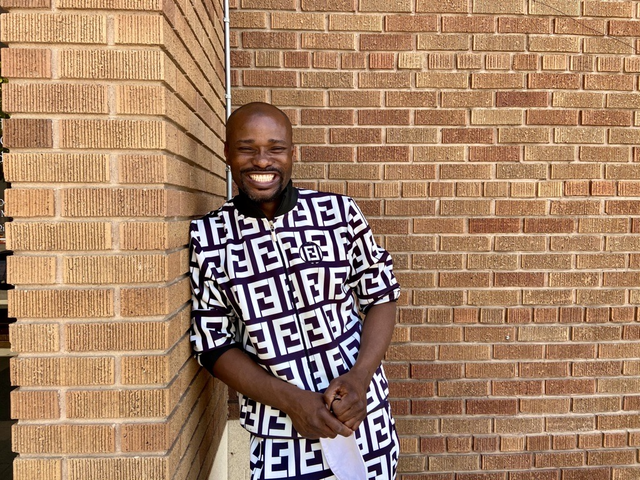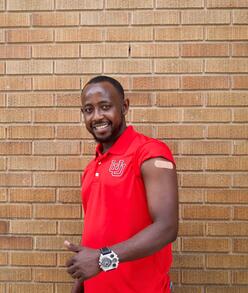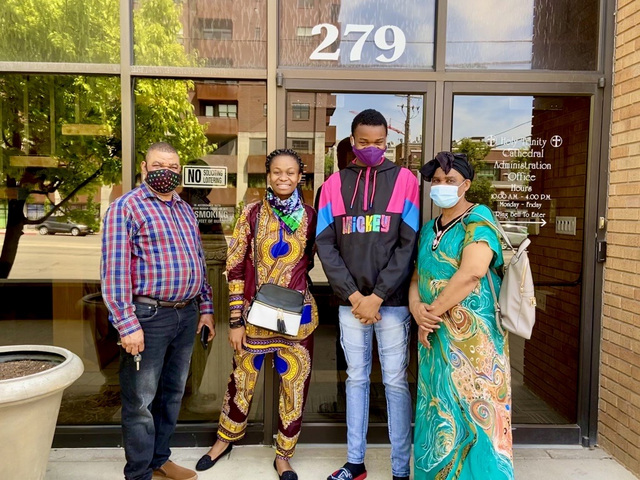
In May, the International Rescue Committee (IRC) in Salt Lake City organized a vaccine clinic with the Salt Lake County Department of Health refugee and new American communities, including producing videos in eight languages about staff members’ personal experiences receiving the vaccine. The Greek Orthodox Church provided the space for the clinic, and generously opened their food pantry for the families attending the clinic. After receiving their vaccines, people were also provided a meal from the Nourish to Flourish Initiative. “Every single client who came, left with tons and tons of food,” laughed Pamela Silberman, health program manager at the IRC in Salt Lake City.
Pamela shared that the weeks leading up to the clinic were filled with calls to families informing them of the opportunity and registering households for a time slot. “That was the big task,” Pamela shared. “We ran reports looking at all of the clients we served, and we wanted to reach beyond our current caseload.” To help the health team, numerous IRC staff stepped up to call families, gather their personal information, and register them for a vaccination time slot.
Mahamat was told about the vaccine clinic by the IRC's volunteer coordinator, Jennifer Dean. “Jen talked to me about the vaccine, she texted me about this opportunity. That is why I am here,” Mahamat shared, “She changed my mind, honestly,” he laughed.

Mahamat said he was initially more worried about the vaccine because of things he saw online about it. Now, Mahamat said he felt good about getting the vaccine and was happy to see many other people at the clinic waiting to get theirs.
Mahamat was not alone in having reservations about the effects of the vaccine. Wilonja felt firmly against the vaccine, believing it could have dangerous side effects. However, his caution subsided after his caseworker shared her vaccination story with him. She messaged him after receiving it, showing that she was feeling well. “Okay,” he responded. “I’ll get [vaccinated].”
When Wilonja arrived at the vaccine clinic, he seemed to be in high spirits. “I will tell the community to get over that false information they are getting,” he shared. “Refusing is not a solution. I took my vaccine, I’m fine.”
Naomi feels similarly passionate about sharing her experience with others in the community. “I will convince those who don’t want to get to get [the vaccine], so we can all be safe and nobody else gets [the virus],” she said. Naomi and Nasse, her brother, came to get their first dose with their parents. Naomi felt a little nervous when receiving the vaccine. “I was afraid,” she shared. “Right now, I think I will be fine, nothing bad will happen,” she laughed.
She looks forward to taking off her mask once she receives her second dose. Nasse is also looking forward to being vaccinated and traveling with his high school basketball team to tournaments.

Clemantine was also initially more worried about the side effects, but after talking to her doctor she feels more confident. As a refugee from Africa, she understands the importance of vaccines against illnesses like polio and the seriousness of COVID-19. “It’s a serious, serious vaccination, that’s why I decided for me and my family to come take it.”
Like many, Clemantine also wants to tell her friends about the importance of getting the vaccine, and that it is worth the possible temporary side effects. “All vaccines are like that! You may get sick but then you are okay.”
All who received their first doses of the vaccine at the May clinic will be receiving their second doses in June, but Pamela is also looking forward to being able to provide more first dose vaccines for those who didn’t come to the May clinic.
Through a coordinated and comprehensive effort, including supporting the Utah Department of Health Community Health Worker initiative, the health program at the IRC in Salt Lake City continues to supply accurate and updated information to refugee communities about the vaccine while working to identify and reduce barriers preventing families from accessing the vaccine. Learn how you can support the IRC in Salt Lake City’s ongoing pandemic response and other initiatives by visiting Rescue.org/SupportSLC.
